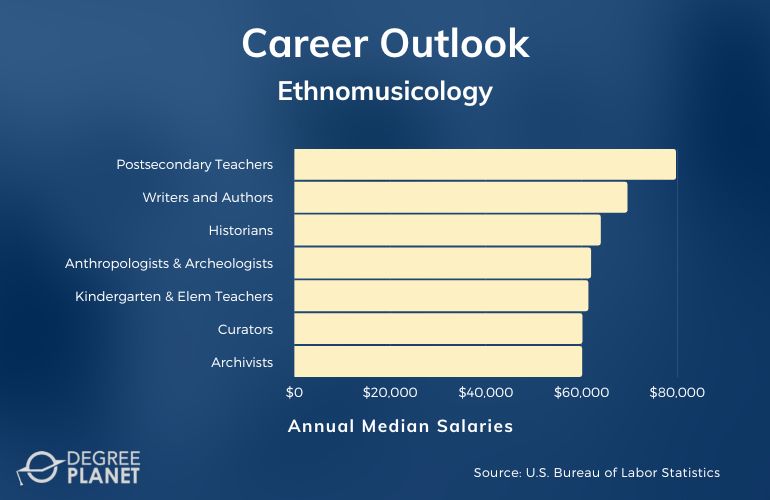If you love music and culture and have the desire to learn more about music in historical, social, and cultural contexts, then you might consider earning a masters in ethnomusicology.

In this program, you can develop your research skills while advancing your professional qualifications for a music career in academia or cross-cultural settings.
Editorial Listing ShortCode:
Ethnomusicology masters programs explore how different cultures are expressed through music while preparing you for various careers. Many graduates also go on to pursue doctoral studies.
Masters in Ethnomusicology Programs Online

An ethnomusicology master’s degree can be fitting for students who are interested in studying all types of music from every corner of the world.
Ethnomusicologists explore other cultures through music, learning about a culture’s history, traditions, and society within the context of its music. Many programs teach the research and fieldwork skills needed for cultural studies, including interviewing, video and audio recording, photography, and cultural observation.
Valuable skills that you can develop throughout an ethnomusicology program include:
- Musical knowledge
- Communication skills
- Note-taking and writing skills
- Cultural sensitivity
- Willingness and ability to travel
- Interviewing skills
- Research skills
Some programs offer specializations that allow you to tailor your program to your interests and career goals. Specializations in ethnomusicology graduate programs can include:
- Global Studies. This concentration focuses on communication and culture.
- Music Education. This concentration focuses on curriculum development and teaching.
Course topics you may take as you earn your ethnomusicologist degree could include world music analysis and issues and trends in ethnomusicology. Most programs teach the history of many types of global music, including Eastern European, Middle Eastern, Indian, Native American, African, and popular world music today.
Editorial Listing ShortCode:
Ethnomusicology is about studying not only a culture’s music and musical instruments but also the interrelation of music, culture, society, and history. In addition to studying music, you will likely also study broader cultural issues, including gender studies, politics, sociocultural identity, and ethnomusicology-related culture, like a dance.
Graduates who have earned their ethnomusicology master’s degree may seek employment as:
- Music educators
- Museum workers
- Archivists
- Anthropologists
- Music directors
Ethnomusicologists may also have the opportunity to travel across the world as part of their research or as global non-profit and cross-cultural workers. The work of ethnomusicologists is essential in helping us understand the meaning behind the music of the world.
Ethnomusicology Careers and Salaries

Earning an ethnomusicology master’s degree can help you qualify for careers in the field. Graduates who are interested in careers making music often pursue careers as musicians, music directors, composers, and ministers of music.
According to data from the Bureau of Labor Statistics, below are the salaries of careers you may explore with a master in ethnomusicology.
| Careers | Annual Mediaun Salaries |
| Postsecondary Teachers | $79,640 |
| Writers and Authors | $69,510 |
| Historians | $63,940 |
| Anthropologists and Archeologists | $61,910 |
| Kindergarten and Elementary School Teachers | $61,350 |
| Curators | $60,110 |
| Archivists | $60,050 |
| Social Science Research Assistants | $49,720 |
| Music Directors and Composers | $49,130 |
| Museum Technicians and Conservators | $47,630 |
Many graduates find opportunities in music education, including careers as music teachers, postsecondary teachers, and music educators. Those who work in schools might need additional licensure.
There are also opportunities for study and research. These positions can include ethnomusicologist, music anthropology researcher, and social scientist. Graduates interested in community and culture can pursue opportunities with non-profit organizations as intercultural outreach workers, mission workers, and cross-cultural workers.
Editorial Listing ShortCode:
There are also various career opportunities in museums, curating historical music exhibits, educating the public, and acquiring musical artifacts.
Ethnomusicology Master’s Curriculum & Courses

While the specific curriculum will vary between ethnomusicology graduate programs, below are some common courses you may take:
- Introduction to Ethnomusicology: This course introduces you to the history of ethnomusicology, including techniques of field research and transcription.
- Folk Music of Europe and North America: Students in this course will study musical cultures from Europe as well as North, South, and Central America.
- Arts in Global Engagement: In this course, you’ll learn how to facilitate community outreach and engagement, building relationships through the world of music.
- Asian Music: Students in this course will study art and popular music within the context of Asian culture.
- Music of the Middle East: This course focuses on the culture of music from the Middle East, including historical and social culture and context.
- History of Jazz: Students in this course will study the history and evolution of jazz from its beginning up to the present day.
- Issues and Trends in Ethnomusicology: This course analyzes specific theories and philosophies in ethnomusicology from its beginnings to the present.
- World Music Analysis: In this course, you’ll analyze musical elements—including tuning, timbre, and improvisation—and you’ll develop listening and transcription skills.
- Music Bibliography and Research Methods: Students in this course will study techniques of musical research and writing.
- Popular World Music: Students in this course will study musical genres across the globe, including the effects of modern influences on world music.
Some programs allow you to choose courses that align with your specialization or area of interest.
Admissions Requirements

While admissions requirements vary between a master in ethnomusicology programs, below are some common requirements for masters programs:
- Bachelor’s degree
- Official college transcripts
- Letter of intent describing your purpose for wanting to enroll and your career goals
- Resume detailing your academic and professional experience
- GRE or GMAT scores (not required by all schools)
Many programs will also require you to complete an online application. Some programs may prefer your bachelors degree to be in music or a related field.
Accreditation

When choosing a school for your masters degree in ethnomusicology program, one factor to consider is the school’s accreditation status.
Accreditation is the process that ensures a school’s educational offerings meet quality standards verified by a third party. While there are different types of school accreditation, regional accreditation is the most widely accepted. Accreditation is important since it may affect everything from your future eligibility for doctoral programs to job opportunities after graduation.
Editorial Listing ShortCode:
You can visit the Council for Higher Education Accreditation website to learn more about regional accreditation.
Financial Aid and Scholarships

Many graduate students seek financial aid resources to help them cover the cost of their studies. If you are currently employed, you could see if your employer offers tuition reimbursement programs or reduced tuition options with certain schools.
You can also explore scholarship opportunities that may be available through a variety of public and private institutions. There are also a variety of financial aid options that may be available to you through the state and federal government. Student loans are one of the most common forms of federal aid.
To learn more about the financial opportunities that may be available to you, you can visit the Federal Student Aid website.
What Can You Do with an Ethnomusicology Masters Degree?

Professionals who have earned their ethnomusicology master’s degree can pursue opportunities in a range of fields, including education, research, music performance, and non-profit work, among others.
Many graduates go on to teach music education at every level, from elementary school students to adults. Graduates interested in research can pursue opportunities at the postsecondary level or in museum work. Some may go on to become writers, music historians, museum curators, or archivists.
There are also many opportunities in social service and non-profit work for those who want to be involved with different cultures within communities.
Others may even continue their education in music production schools that often offer a variety of interesting programs.
How Much Money Does an Ethnomusicologist Make?

Based on data from the Bureau of Labor Statistics, here are the annual median salaries of some potential career paths that many ethnomusicologist graduates pursue:
- Postsecondary teachers — $79,640
- Historians — $63,940
- Curators — $60,110
- Archivists — $60,050
- Music directors and composers — $49,130
How much money you can make in the field of ethnomusicology will vary based on a variety of factors. These factors could include where you live, your work experience, your prior education, your musical skills, and the current job market.
How Long Does It Take to Get an Online Masters in Ethnomusicology?

A masters can generally be completed in 1 to 2 years, but the time needed to complete your ethnomusicology master’s degree will vary based on several factors. For instance, your program may take longer to finish if it requires the completion of a thesis.
If a program consists of around 36 credit hours and does not include a thesis component, then it can likely be completed in 1 year with full-time study, including enrollment during the summer. On the other hand, if you are enrolled part-time, it will often take longer for you to complete your program.
Is a Masters in Ethnomusicology Degree Worth It?

Yes, a masters in ethnomusicology degree is worth it for many students. Graduates can pursue careers in a variety of settings, including public and private institutions and non-profit organizations.
Given the diversity of cultures and music across the world, there will likely continue to be a need for those interested in studying this field and in teaching others. If you’re interested in pursuing your PhD, some joint programs let you earn your master’s as part of a PhD program, allowing you to get a head start on your doctoral degree.
Editorial Listing ShortCode:
According to the Bureau of Labor Statistics, archivists and postsecondary teachers are expected to see 9% and 12% job growth, respectively, over the next ten years, which is faster than average.
Universities Offering Online Masters in Ethnomusicology Degree Programs
Methodology: The following school list is in alphabetical order. To be included, a college or university must be regionally accredited and offer degree programs online or in a hybrid format.

Liberty University offers a Master of Arts in Ethnomusicology program online. Studies may be customized by selecting a general, global studies, or music education focus area. Classes are typically 8 weeks long. The completion of 36 credit hours is required, which may be done in just 1.5 years of full-time study.
Liberty University is accredited by the Southern Association of Colleges and Schools Commission on Colleges.

Texas Tech University offers a Master of Music in Musicology program online or in a hybrid model with a concentration in Ethnomusicology. The curriculum typically covers concepts like world music, music education, performance, community engagement, and musicianship.
The program requires the completion of 30 credit hours and courses are designed to develop the ability to think, write, and speak critically about music’s meaning in diverse settings.
Texas Tech University is accredited by the Southern Association of Colleges and Schools Commission on Colleges.
Universities Offering Masters in Ethnomusicology Degree Programs
With only a limited number of online music degree programs available, here are some additional universities offering this program on campus. To be included, a college or university must be regionally accredited.

Arizona State University offers a program for a Master of Arts in Ethnomusicology. The program is designed to provide scholarship and performance expertise while focusing on specific world musical cultures. The program required the completion of at least 30 credits. Common careers for graduates may include arts administrator, professor, performer, ethnomusicologist, or community arts advocate.
ASU is accredited by the Higher Learning Commission.

Indiana University offers a Master of Arts in Ethnomusicology program. Potential classes include Paradigms of Ethnomusicology, Survey of Folklore, and Readings in Ethnography. The program requires reading proficiency in at least one language other than English for admission. The program requires the completion of 30 credit hours culminating with a final exam, project, or traditional thesis.
Indiana University is accredited by the Higher Learning Commission.

The University of Arizona offers a program for a Master of Music in Ethnomusicology. Courses cover topics like music theory, history of music, instrument and vocal performance, composition, and music education. The program has start dates for fall and spring terms each year. At least 30 credits must be completed while maintaining a minimum 3.0 GPA in order to graduate.
The University of Arizona is accredited by the Higher Learning Commission.

University of Hawaii–Manoa offers a Master of Arts in Ethnomusicology program. Courses in world music typically place particular emphasis on Asian, Pacific, and American geo-cultural areas. Participation in musical activity is an integral part of the program. The curriculum consists of 30 credit hours. Upon completion of required coursework, a final project or traditional thesis is also required.
The University of Hawaii – Manoa is accredited by the Western Association of Schools and Colleges.

The University of Minnesota offers a Master of Arts in Musicology and Ethnomusicology program. The curriculum commonly incorporates historical criticism, archival research, source studies, performance, and gender studies. Required credit hours may vary based on the selection of final research projects versus a thesis. Proven proficiency in German, French, or Italian language may be required in order to graduate.
The University of Minnesota is accredited by the Higher Learning Commission.

The University of Mississippi offers a Master of Music program with a concentration in Ethnomusicology. Potential courses include Ethnographic Methods and Transcription, African Music Ensemble, and Perspectives in World Music. The program consists of 30 total credit hours, designed to provide a broad research background, and a thesis is also required.
The University of Mississippi is accredited by the Southern Association of Colleges and Schools Commission on Colleges.

The University of Rochester offers a program for a Master of Music in Ethnomusicology. Regional specializations include African, Asian, North American, and Latin American music. Classes aim to teach concepts like musical performance, historical research, music theory, education, and composition. At least 1 year of full-time study completed on campus is required.
The University of Rochester is accredited by the Middle States Commission on Higher Education.

The University of Washington offers a Master of Arts in Ethnomusicology program. At least 1 year of core music history study and 1 year of music theory and ear-training should have been completed before starting the program. On average, with full-time study, the 51 required credit hours are completed in just 2 years.
The University of Washington is accredited by the Northwest Commission on Colleges and Universities.
Earning Your Masters in Ethnomusicology Online

Earning your ethnomusicology master’s degree can help prepare you for a career that involves music, culture, community, and education.
A graduate degree in ethnomusicology is fitting for those who love to learn about other cultures through music. Graduates may even go on to teach or perform music. Many ethnomusicology professionals pursue careers in education, research, and non-profit work. There’s also the potential to travel the world as part of your work.
If you’re ready to grow your expertise in music and culture, you can start researching online ethnomusicology programs from accredited schools to discover which one best aligns with your interests.

